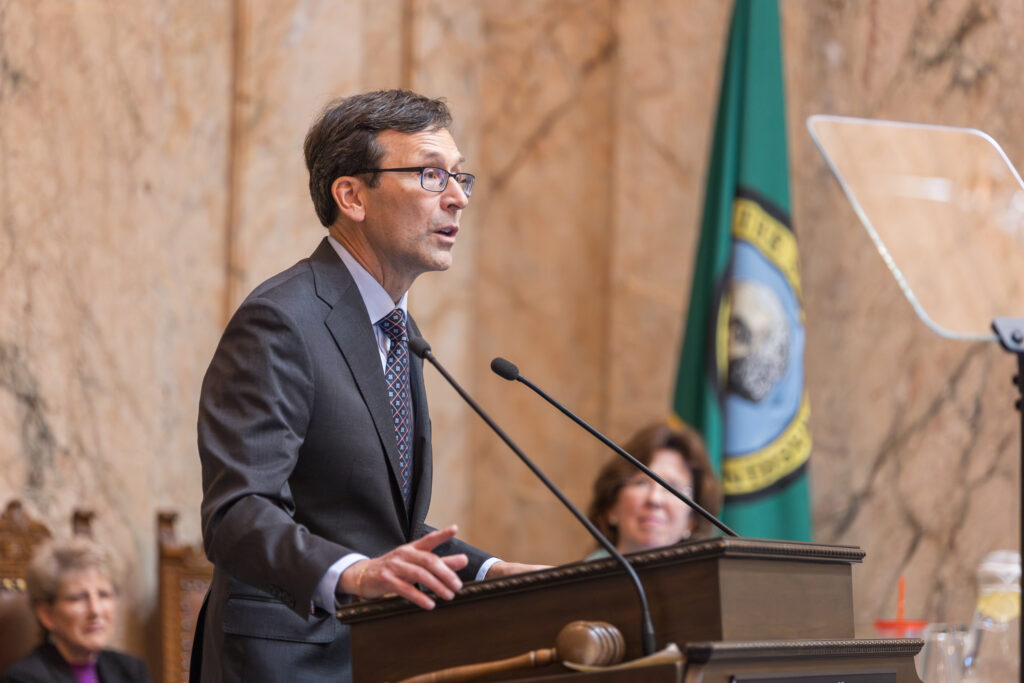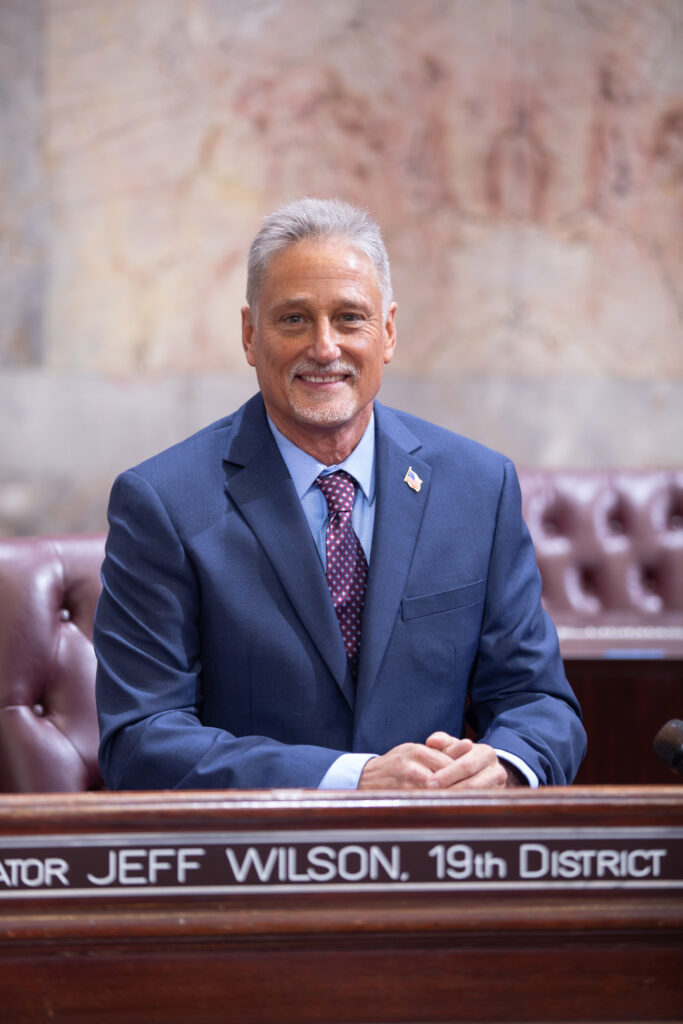Note: The following e-newsletter was sent to Sen. Jeff Wilson’s subscribers May 22, 2025. To subscribe to Sen. Wilson’s e-newsletters, click here.
Dear Friends and Neighbors,
We’ve just seen the final act of this year’s legislative session – and boy, was it a letdown. On Tuesday our new governor signed off on the biggest tax increase in state history and gave his approval to one of the most reckless budgets the Legislature has ever passed. He made a few vetoes, but not enough to make a difference.
These minor adjustments made by the governor bring this year’s tax hikes to $12.25 billion on the state and local levels over the next four years. Transportation taxes normally are considered separately, but if we add this year’s increases in gas taxes and transportation fees, the total rises to $14.15 billion.
I don’t know about you, but I find this staggering. Not so very long ago – 1989 – we were able to run the entire state for two years on a budget of just $13.2 billion. That’s about how much the Legislature increased taxes this year. It’s as if numbers have no meaning. State spending has skyrocketed, doubling in just ten years. Our majority colleagues wanted to keep it soaring. By raising taxes, they were able to boost spending to nearly $80 billion, while avoiding the fuss and bother of correcting their course and making state government as efficient as it ought to be. I think it’s time we draw a few conclusions.
“Progressive” majority makes spending its top priority
Everyone knew the state was spending itself into trouble, but our friends in the majority couldn’t help themselves. Since Democrats took full control of the statehouse in 2018, every two-year budget they have written spent more money than we had. That couldn’t last forever, and sure enough, our colleagues eventually spent the state into a budget crisis. This year we had enough money to meet the state’s basic needs, but we were $7 billion short of the amount needed to pay for all the new spending our friends had approved in previous years. And they wanted to spend even more.
The key thing is this. In previous years, both parties would have taken this as a wake-up call. The Legislature would have worked cooperatively to trim the sails, rein in spending, identify priorities. We could have made it through this situation without a tax increase, while avoiding harmful cuts. All we had to do was avoid new spending. Senate Republicans wrote a budget that proved it. But our majority colleagues weren’t willing to do that. They were stuck on spending. So they enacted the biggest tax increase of all time, and they decided to send the bill to you, the taxpayers of Washington state.
Governor talks tough, fails to deliver
 When Bob Ferguson took office as governor this year, I wanted to believe in his moderate rhetoric. Certainly we had to respect his tough talk about balancing spending with cuts, avoiding reliance on untested taxes likely to be overturned by the courts, and so on. He convinced his party to reduce the size of the tax increase – originally it proposed about $21 billion in new state and local taxes. But since the number should have been zero, this wasn’t much of a victory. When it came time to fish or cut bait, Ferguson didn’t have the guts to veto the budget, call the Legislature back into session and tell us to start over. His weakness this first session was a major disappointment.
When Bob Ferguson took office as governor this year, I wanted to believe in his moderate rhetoric. Certainly we had to respect his tough talk about balancing spending with cuts, avoiding reliance on untested taxes likely to be overturned by the courts, and so on. He convinced his party to reduce the size of the tax increase – originally it proposed about $21 billion in new state and local taxes. But since the number should have been zero, this wasn’t much of a victory. When it came time to fish or cut bait, Ferguson didn’t have the guts to veto the budget, call the Legislature back into session and tell us to start over. His weakness this first session was a major disappointment.
Emboldens future Legislatures
What happens tomorrow is what scares me the most. When will this stop? This year’s session set a precedent. It was the first time the Legislature created a budget crisis all by itself, without the help of a recession or some other external cause. By handing the bill to taxpayers and failing to address the underlying problem of unsustainable spending, our colleagues have ensured we will face greater problems in the future. They have thrown off the notion of checks and balances and set the stage for further recklessness and irresponsible fiscal policies.
How do you stop a runaway train? Usually it takes a crash. Only by restoring the concepts of moderation, bipartisanship and compromise can we avoid another train wreck like this one.
Governor signs bill to test for ‘forever chemical’ contamination in food supply
New law creates testing program for biosolid fertilizers; another measure affirms Castle Rock library arrangement
Biosolids are applied to a farm field. /Credit: CC-by-2.0 CityofGeneva (Ill.)
Last week the governor signed a bill I sponsored launching a testing program for fertilizers made from processed human waste. The bill highlights growing concerns with perfluoroalkyl and polyfluoroalkyl (PFAS) compounds, used in carpets, nonstick cookware, firefighting foam and other applications. These compounds resist water, oil and grease, but because they do not readily decompose in the environment, they can accumulate in the human body.
SB 5033 directs the state Department of Ecology to develop a program to test for PFAS concentrations in fertilizers made from processed human waste. The department must provide guidance on biosolid testing requirements by July 1, 2026 and report findings to the Legislature before the 2030 session. The bill also establishes an advisory committee including toxicologists and representatives of agriculture and public utilities.
This is a problem we need to take seriously. PFAS compounds don’t break down, and they can’t be remediated like other chemicals. We need to find ways to keep them out of our food supply, and the first step is to determine whether contamination is a problem when biosolid fertilizers are used on crops destined for human consumption.
Also signed into law was SB 5365, clarifying that public libraries can be included in community centers and funded by parks and recreation districts. This measure clears up a gray area in the law and affirms an arrangement that has benefited the city of Castle Rock for the last dozen years. This is a way for smaller cities to share space and more effectively use limited resources. The new law will allow similar projects to move forward statewide. One that will benefit from this legislation is a Kelso low-income housing project partially funded by this year’s capital budget that includes a community center and a library.
Thanks for reading!
Sen. Jeff Wilson
19th Legislative District
Contact me!
Email: Jeff.Wilson@leg.wa.gov
Mailing address: P.O. Box 40419 /Olympia, WA 98504
Leave a message on the Legislative Hotline: 1-800-562-6000
Take our survey: Let us know what you think at http://www.JWilsonSurvey.com
To unsubscribe from these regular updates from Olympia, go to the Subscriber Preferences Page below.















